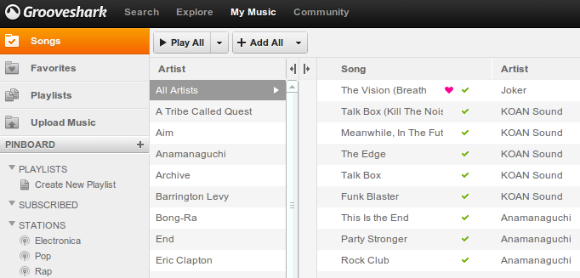The rapidly changing nature of the internet means that services can fall out of favor as quickly as they explode in interest. Who knows if we'll refer to Facebook and WhatsApp in the same sentence as MySpace and AIM in a few years?
Today we're going to take a step back and look at once-popular web services that went extinct. We'll see exactly why they went defunct, and provide the best alternatives to them.
Note that in this list, we're only including old websites that are no longer available. We've left out services like Digg that are a shadow of their former selves but still in service.
1. ChaCha
Founded: 2006 | Defunct: 2016
Before internet access was ubiquitous on mobile phones, people had to wait to get answers for their questions when they weren't home. If you were out with friends and wanted to know the weather across the world or some obscure piece of sports trivia, you couldn't easily Google it on the go.
In addition, search engines of the time weren't always good at answering questions like they are now. They could match keywords, but questions tripped them up.
That's where ChaCha came in. It was a human-powered search engine that you interacted with via texting. Sending an SMS to 242-242 with your question would lead to a team member replying with an answer. Since it was free, and most people had access to texting, it was a great way to get quick information when you weren't at a computer.
ChaCha paid its part-time workers a few cents per answer. And while the company had strong beginnings with an investment from Jeff Bezos, the widespread adoption of smartphones meant that its services became increasingly unnecessary.
In late 2016, ChaCha shut down completely due to a lack of funding. The company's owner moved to Hawaii but couldn't even pay the employees what they were due. It's a sad case of a model that was brilliant at the time but became unnecessary as Google became more powerful and ubiquitous.
ChaCha Alternatives
Google's free mobile apps can answer pretty much anything ChaCha could. Its recent updates have made refinements to Featured Snippets, which pull relevant info from a page so you get an answer to your question without even leaving the results page.
If you'd prefer a human answer to your questions, the Stack Exchange network of sites is a great place for questions and answers. Quora is a similar service, and you can always ask questions on Reddit and other forums too.
2. Grooveshark
Founded: 2006 | Defunct: 2015
People have wanted to find free music online since the dawn of the internet. While downloading from old websites like LimeWire was a popular option, that came with the risk of a virus infection. Grooveshark provided music fans with a way to listen to whatever they liked in a browser for free.
Since you streamed music instead of downloading it, it was a safer alternative to other piracy services. Remember that at the time, Spotify wasn't widely available yet and Pandora only allowed you to listen to the radio. Grooveshark letting you search for any song and create your own playlists was quite convenient.
This site allowed anyone to upload music so others could find it. While it wasn't always a super polished experience (miscategorized and partial songs popped up often) it was good enough for a lot of people.
Though it didn't allow users to download tracks, Grooveshark was still an illegal service. It had several bouts with the law that didn't produce lasting results, but that changed in 2015. The site settled with the big three records companies and immediately shut down.
You can read a more detailed history of the service in our Grooveshark retrospective.
Grooveshark Alternatives
As you're probably aware, you have lots of options for replacing Grooveshark. Spotify is probably the closest alternative, as it lets you stream millions of songs on your desktop for free. However, you'll need to pay for a Premium subscription if you want to remove the ads.
If you don't like Spotify, you can try one of the many other music streaming services. Most of them have a free plan that should more than fill the void Grooveshark left behind.
3. Megaupload
Founded: 2005 | Defunct: 2012
Megaupload was an extremely popular service for uploading and sharing content both legal and illegal. It seemed that nearly everyone who wanted to make a file available for others in YouTube descriptions, forum posts, or similar put it on Megaupload. In fact, when the service closed down, it held 25 petabytes of data!
One of the biggest legal problems with Megaupload was that when a user uploaded a file that matched one already on the service, the uploader asked to create another link to the file instead of adding a duplicate. Under DMCA, Megaupload only had to remove a link when the copyright holder requested it. Thus, a DMCA takedown could potentially remove just one link from the many pointing to an illegal file.
In early 2012, the US Department of Justice took control of Megaupload and shut it down. The government claimed that several behaviors on the site proved criminal intent. These included the fact that only the most popular files were kept available for download, the ad-focused revenue scheme was dependent on maximizing downloads, and more.
Megaupload was semi-reborn as Mega a year later. This version encrypts files before uploading, meaning the company can't access them. It also doesn't use the matching system to create multiple links to one file, so Mega should be more government-proof.
On a similar note, Rapidshare was a service much like Megaupload. Once the latter was taken down, Rapidshare changed its ways to avoid a similar fate. This killed the service's popularity and crippled the company, resulting in its closing down in 2015.
Megaupload Alternatives
Mega is a decent alternative to Megaupload. If you don't want to use it, any cloud storage provider like Dropbox or Google Drive works too.
Barring that, check out tons of easy ways to share files without cloud storage.
4. Orkut
Founded: 2004 | Defunct: 2014
Orkut was a wildly popular social media website before the dominance of Facebook. It was most popular in India and Brazil and was created by Orkut Büyükkökten as an independent project while he was working for Google.
At first, Orkut made networking more open by allowing anyone to visit your profile unless they were on your block list. It had standard social features like creating polls, sharing videos, and liking posts.
Nothing particularly interesting happened to cause Orkut's demise. While it enjoyed popularity in a few regions, much of the world didn't use it. This meant that Google's other products like YouTube and Blogger outpaced Orkut.
Combined with the dominance of Facebook and Google+, which Google was still pushing at the time, the company cut the dead weight in late 2014.
Orkut Alternatives
You're probably already on an alternative to Orkut. The best social network is the one that most of your friends use. Facebook is an obvious choice, while Twitter, Instagram, and Snapchat are also popular.
5. Heat.net
Founded: 1997 | Defunct: 2000
One of the lesser-known old websites, Heat was ahead of its time. Heat.net was an online gaming platform from Sega. It let you enjoy first and second-party games, along with other big games like Quake 2, online with other players. The subscription cost $10 per month and included chat lobbies.
But the service quickly ran into problems. It rewarded players with currency named "degrees" simply for staying connected to the service. It didn't take long for players to abuse this, as they'd leave their computers connected but idle and earn degrees for doing nothing. You could spend these degrees on games, magazines, and computer hardware.
Sega reduced the value of degrees to combat this problem, but it wasn't enough. The company closed down Heat.net in 2000 and replaced it with SegaNet, a new online service for the Dreamcast. However, the Dreamcast failed due to the hype from the upcoming PlayStation 2, resulting in Sega discontinuing the console in early 2001.
This, in turn, led to Sega exiting the video game console business entirely. It's easy to trace modern online services like Xbox Live back to Heat.net, so it definitely had an impact.
Heat.net Alternatives
Steam is the closest modern service to Heat.net on PC, as it lets you buy and play games online with others. If you play on a console, you can subscribe to PlayStation Plus or Xbox Live to enjoy many of the same features.
Popular Old Websites That Died: Gone but Not Forgotten
You'll note that we didn't include any Google services here. But in fact, Google has killed off so many services that it's hard to count them all.
These five services were all popular for some time but faded as technology advanced. But whether they were superseded by superior alternatives, forced to shut down due to illegal content, or just couldn't keep up, none could stay afloat.
It's fun to take a nostalgic look back to see what was popular years ago, and what we can learn. Thankfully, all these old websites have modern equivalents.
For more, check out these famous programs that no longer exist.


